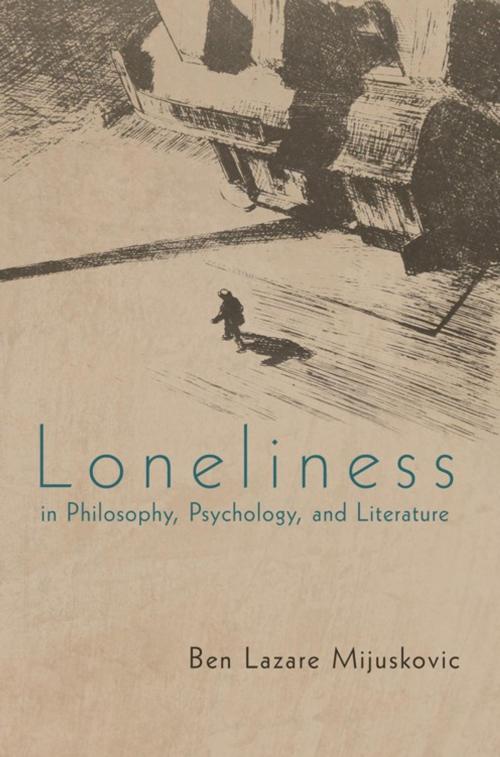Loneliness in Philosophy, Psychology, and Literature
Third Edition
Nonfiction, Religion & Spirituality, Philosophy, Health & Well Being, Psychology| Author: | Ben Lazare Mijuskovic | ISBN: | 9781469789354 |
| Publisher: | iUniverse | Publication: | April 20, 2012 |
| Imprint: | iUniverse | Language: | English |
| Author: | Ben Lazare Mijuskovic |
| ISBN: | 9781469789354 |
| Publisher: | iUniverse |
| Publication: | April 20, 2012 |
| Imprint: | iUniverse |
| Language: | English |
Drawing on the fields of psychology, literature, and philosophy, Loneliness in Philosophy, Psychology, and Literature argues that loneliness has been the universal concern of mankind since the Greek myths and dramas, the dialogues of Plato, and the treatises of Aristotle.
Author Ben Lazare Mijuskovic, whose insights are culled from both his theoretical studies and his practical experiences, contends that loneliness has constituted a universal theme of Western thought from the Hellenic age into the contemporary period. In Loneliness in Philosophy, Psychology, and Literature, he shows how man has always felt alone and that the meaning of man is loneliness.
Presenting both a discussion and a philosophical inquiry into the nature of loneliness, Mijuskovic cites examples from more than one hundred writers on loneliness, including Erich Fromm, Frieda Fromm-Reichmann, Clark Moustakas, Rollo May, and James Howard in psychology; Thomas Hardy, Joseph Conrad, James Joyce, Thomas Wolfe and William Golding in literature; and Descartes, Kant, Kierkegaard, Nietzsche, and Sartre in philosophy.
Insightful and comprehensive, Loneliness in Philosophy, Psychology, and Literature demonstrates that loneliness is the basic nature of humans and is an unavoidable condition that all must face.
European Review, 21:2 (May, 2013), 309-311. Ben Mijuskovic, Loneliness in Philosophy, Psychology, and Literature (Bloomington, IN: iUniverse. 2012).
Ben Lazare Mijuskovic offers in his book a very different approach to loneliness. According to him, far from being an occasional or temporary phenomenon, lonelinessor better the fear of lonelinessis the strongest motivational drive in human beings. He argues that following the replenishment of air, water, nourishment, and sleep, the most insistent and immediate necessity is man desire to escape his loneliness, to avoid the feeling of existential, human isolation (p xxx). The Leibnizian image of the monadas a self-enclosed windowless beinggives an acute portrait of this oppressive prison. To support this thesis, Mijuskovic uses an interdisciplinary approach--philosophy, psychology, and literaturethrough which the picture of man as continually fighting to escape the quasi-solipsistic prison of his frightening solitude reverberates.
Besides insisting on the primacy of our human concern to struggle with the spectre of loneliness, Mijuskovic has sought to account for the reasons why this is the case. The core of his argumentation relies on a theory of consciousness. In Western thought three dominant models can be distinguished: (a) the self-consciousness or reflexive model; (b) the empirical or behavioral model; and (c) the intentional or phenomenological model. According to the last two models, it is difficult, if not inconceivable, to understand how loneliness is even possible. Only the theory that attributes a reflexive nature to the powers of the mind can adequately explain loneliness. The very constitution of our consciousness determines our confinement. When a human being successfully reflects on his self, reflexively captures his own intrinsically unique situation, he grasps (self-consciously) the nothingness of his existence as a transcendental conditionuniversal, necessary (a prioristructuring his entire being-in-the-world. This originary level of recognition is the ground-source for his sensory-cognitive awareness of loneliness (p. 13). Silvana Mandolesi
Drawing on the fields of psychology, literature, and philosophy, Loneliness in Philosophy, Psychology, and Literature argues that loneliness has been the universal concern of mankind since the Greek myths and dramas, the dialogues of Plato, and the treatises of Aristotle.
Author Ben Lazare Mijuskovic, whose insights are culled from both his theoretical studies and his practical experiences, contends that loneliness has constituted a universal theme of Western thought from the Hellenic age into the contemporary period. In Loneliness in Philosophy, Psychology, and Literature, he shows how man has always felt alone and that the meaning of man is loneliness.
Presenting both a discussion and a philosophical inquiry into the nature of loneliness, Mijuskovic cites examples from more than one hundred writers on loneliness, including Erich Fromm, Frieda Fromm-Reichmann, Clark Moustakas, Rollo May, and James Howard in psychology; Thomas Hardy, Joseph Conrad, James Joyce, Thomas Wolfe and William Golding in literature; and Descartes, Kant, Kierkegaard, Nietzsche, and Sartre in philosophy.
Insightful and comprehensive, Loneliness in Philosophy, Psychology, and Literature demonstrates that loneliness is the basic nature of humans and is an unavoidable condition that all must face.
European Review, 21:2 (May, 2013), 309-311. Ben Mijuskovic, Loneliness in Philosophy, Psychology, and Literature (Bloomington, IN: iUniverse. 2012).
Ben Lazare Mijuskovic offers in his book a very different approach to loneliness. According to him, far from being an occasional or temporary phenomenon, lonelinessor better the fear of lonelinessis the strongest motivational drive in human beings. He argues that following the replenishment of air, water, nourishment, and sleep, the most insistent and immediate necessity is man desire to escape his loneliness, to avoid the feeling of existential, human isolation (p xxx). The Leibnizian image of the monadas a self-enclosed windowless beinggives an acute portrait of this oppressive prison. To support this thesis, Mijuskovic uses an interdisciplinary approach--philosophy, psychology, and literaturethrough which the picture of man as continually fighting to escape the quasi-solipsistic prison of his frightening solitude reverberates.
Besides insisting on the primacy of our human concern to struggle with the spectre of loneliness, Mijuskovic has sought to account for the reasons why this is the case. The core of his argumentation relies on a theory of consciousness. In Western thought three dominant models can be distinguished: (a) the self-consciousness or reflexive model; (b) the empirical or behavioral model; and (c) the intentional or phenomenological model. According to the last two models, it is difficult, if not inconceivable, to understand how loneliness is even possible. Only the theory that attributes a reflexive nature to the powers of the mind can adequately explain loneliness. The very constitution of our consciousness determines our confinement. When a human being successfully reflects on his self, reflexively captures his own intrinsically unique situation, he grasps (self-consciously) the nothingness of his existence as a transcendental conditionuniversal, necessary (a prioristructuring his entire being-in-the-world. This originary level of recognition is the ground-source for his sensory-cognitive awareness of loneliness (p. 13). Silvana Mandolesi















